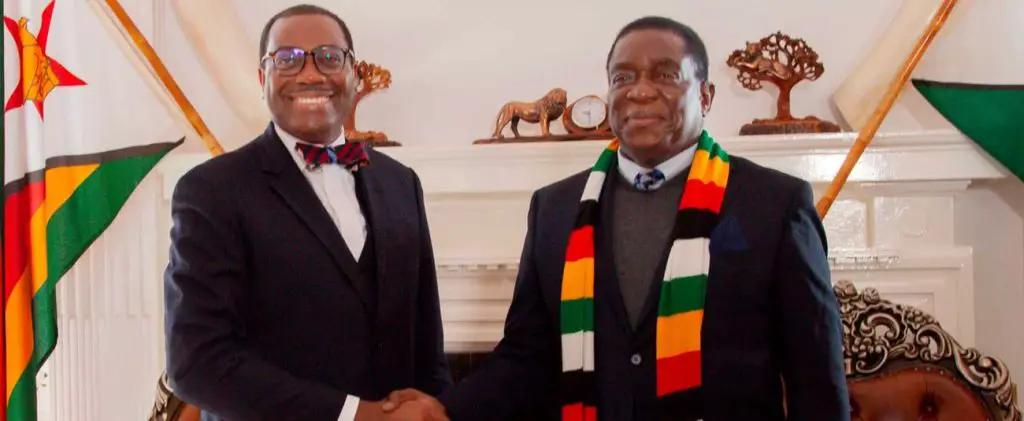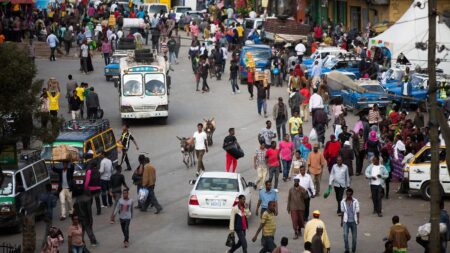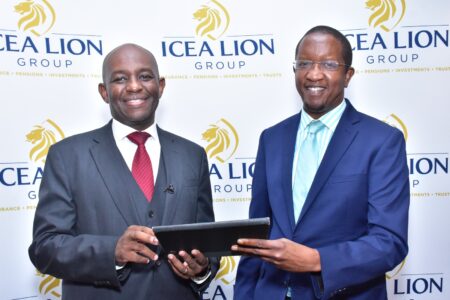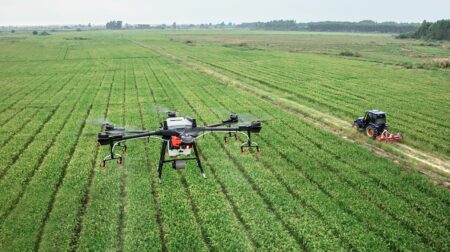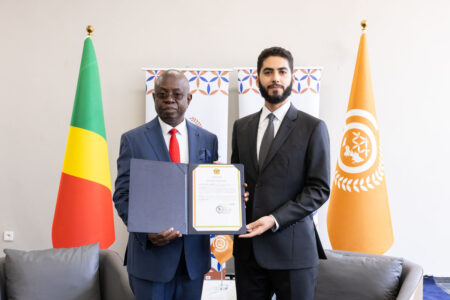- African Development Bank (AfDB) President Dr. Akinwumi Adesina says he has accepted President Emmerson Mnangagwa’s request for the bank to lead the country’s debt repayment strategy
- Although Zimbabwe cleared its arrears to the IMF in 2016, it cannot access funding from the Bretton Woods institution because of the money it owes to the World Bank, AfDB, and European Investment Bank
- Zimbabwe is choking under mounting international debt as it begins to pay the price for borrowing heavily from China for infrastructure projects at the tail end of Robert Mugabe’s rule.
- The Southern African country is also making token payments to all its foreign financiers’ woes, including the Paris Club, which has 17 members, the World Bank, and the African Development Bank (AfDB)
In May, President Mnangagwa requested the African Development Bank (AfDB) to lead Zimbabwe’s debt repayment strategy as the country sought to expunge its unsustainable debt overhang.
According to New Zimbabwe, the huge external debt has been blamed for the country’s failure to access affordable long-term financing from multilateral and bilateral financiers.
Although Zimbabwe cleared its arrears to the IMF in 2016, it cannot access funding from the Bretton Woods institution because of the money it owes to the World Bank, AfDB, and European Investment Bank.
“As a general rule, the IMF is prevented from lending to any member country that has arrears to other international financial institutions,” the IMF said last year as it explained why Zimbabwe was excluded when it gave African countries such as South Africa and Zambia millions in loans to help them cushion their economies against the impact of the Covid-19 pandemic.
According to an article by The Herald dated May 26, 2022, Finance and Economic Development Minister Prof Mthuli Ncube first revealed the bank’s willingness to assist Zimbabwe with its debt when he met the AfDB President in Washington DC in April where the two were part of the World Bank annual meetings.
“The President of the AfDB has put himself forward as a candidate to help the country come up with good staff monitored programmes which also include the International Monetary Fund (IMF),” Minister Ncube said at the time.
Dr. Adesina said Zimbabwe used to be the region’s breadbasket, and “it’s in everybody’s interest to have a revived, renewed and energised Zimbabwe”.
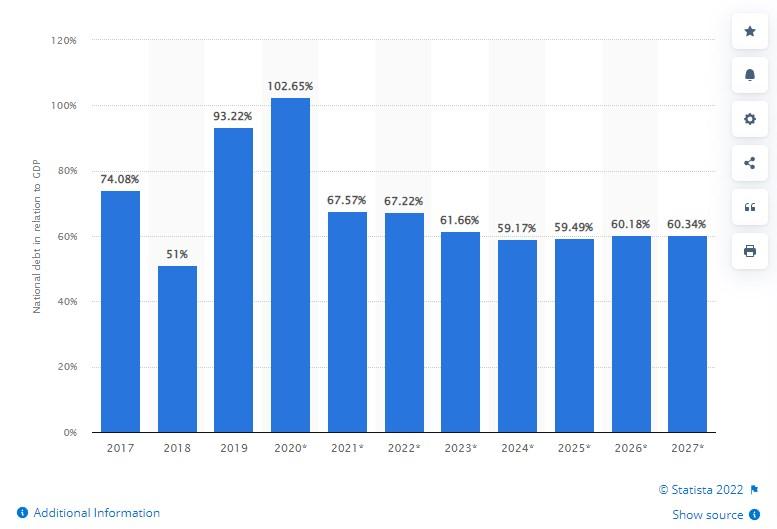
In an article published by New Zimbabwe on July 20, 2022, a report released by the Finance ministry’s debt management office warns that “arrears on external debt, which amounted to US$6.6 billion, remain a major protracted challenge to restoring debt sustainability and to the economy, resulting in the lack of access to official external financing.”
Last year, the country only spent $59.30 million to repay outstanding external loans.
The payments included $9.60 million in token remittances to multilateral banks and Paris Club creditors.
In September last year, the government started making quarterly token payments of $100,000 to each of the 16 Paris Club creditors as it sought ways to extinguish the mounting debt.
As of the end of May, Zimbabwe had made $8 million in token payments to multilateral banks and $4.8 million to the Paris Club creditors.
The article added that Zimbabwe is already defaulting on active loans from China, which is affecting the disbursement of funds for ongoing projects, the debt management office said in the report.
“The low disbursements of loans are due to accumulation of arrears to active China Eximbank loans (amounting to 4266 million) on projects such as the Victoria Falls International Airport ($54 million), NetOne network expansion ($61 million), and expansion of the Robert Gabriel Mugabe International Airport ($3 million),” the report says.
According to New Zimbabwe, to address the debt crisis, Zimbabwe has the idea of joining the Heavily Indebted Poor Country (HIPC) initiative or undertaking a non-HIPC route involving debt restructuring and arrears clearance through bridge financing and using its resources.
The HIPC initiative, which the World Bank and IMF initiated, facilitates 100 per cent debt relief for poor countries upon meeting set stringent requirements.
Previously, Zimbabwe explored the HIPC route when the late Mugabe formed a joint government with late opposition leader Morgan Tsvangirai between 2009 and 2013, but ruling Zanu-PF hardliners shot the idea down.
The Zimbabwe Coalition on Debt and Development (ZIMCODD) said the latest debt strategy would be meaningless without genuine political and economic reforms.
“It remains to be seen if Harare will honour its debt strategy given the fact that the success of all options proposed in this strategy is highly hinged on the full implementation of political and economic reforms,” ZIMCODD said.
“In its conclusion of the 2021 staff monitored programme, the IMF indicated Harare’s lack of progress in instituting these reforms as per the expectations of creditors and the international community.
“While the two options being considered in Harare’s debt strategy are sufficient to bring a lasting solution to the debt crisis, the strategy has also laid bare the effects of toxic politics on economic progression.”
It also noted that the weakening Zimbabwe dollar will worsen the debt crisis as the country struggles to service external loans.
According to the AfDB, Zimbabwe has received reassurance of support for a strong push to help it clear its debt arrears. The African Development Bank (AfDB) Group President Dr. Akinwumi Adesina, representatives of multilateral finance institutions, the Zimbabwean government, and other partners have agreed to work together to develop an action plan to resolve the country’s debt arrears.
Zimbabwe owes USD13.5-billion to multilateral financial institutions, bilateral partners, and other creditors. President Mnangagwa thanked Adesina for accepting to be the champion for the arrears clearance and debt resolution process. He also commended the AfDB for standing by Zimbabwe through difficult circumstances. “During the COVID-19 pandemic, Zimbabwe received no external help except the AfDB. The AfDB was quick to respond to Zimbabwe’s needs. We had to re-prioritize our budget and, ultimately, we managed the situation against all odds,” Mnangagwa said.
The AfDB added that it supported Zimbabwe with USD13.8-million under the bank’s COVID-19 Response Facility. The AfDB has focused on strengthening the country’s public finance management capacity through a Transition Support Facility.
Meanwhile, According to an article by Africa Global Village dated July 13, 2022, the Board of Directors of the African Development Bank (AfDB) Group approved a USD175 million Trade Finance Funded Risk Participation Agreement facility between the AfDB and the Trade and Development Bank (TDB).
According to AfDB, the agreement is expected to boost intra-Africa trade, promote regional integration, and reduce the trade finance gap in Africa. The bank will provide liquidity of up to 50% (the other 50% to be matched by TDB), to issuing banks on a risk share basis to support trade activities of local corporates and small and medium-sized enterprises in member countries of the Common Market for Eastern and Southern Africa.
Together, the two institutions will provide a ticket size of USD350-million to support trade transactions. This is a strategic effort by the AfDB to support the Africa Continental Free Trade Area’s agenda of reshaping markets and economies across the region by helping to boost output in the services, trade, manufacturing, and natural resources sectors.





